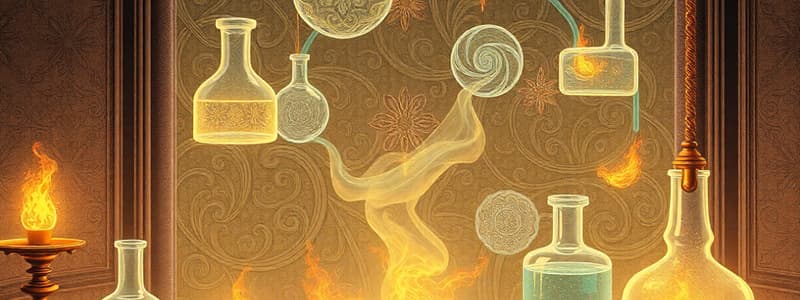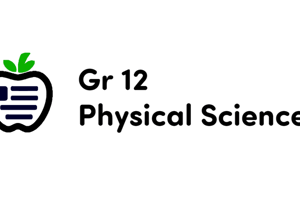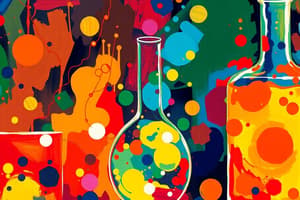Podcast
Questions and Answers
Which statement describes an exothermic reaction?
Which statement describes an exothermic reaction?
- The enthalpy change is positive.
- It releases energy to the surroundings. (correct)
- The products have a higher energy content than the reactants.
- It absorbs heat from the surroundings.
What is the correct sign of the enthalpy change (∆H) for an endothermic reaction?
What is the correct sign of the enthalpy change (∆H) for an endothermic reaction?
- ∆H > 0 (correct)
- ∆H = 0
- ∆H < 0
- ∆H = -1
Which process would be classified as an endothermic reaction?
Which process would be classified as an endothermic reaction?
- Combustion of methane
- Thermal decomposition of calcium carbonate (correct)
- Dissolving anhydrous salts
- Neutralization of an acid
What is the relationship between the energy content of reactants and products in an exothermic reaction?
What is the relationship between the energy content of reactants and products in an exothermic reaction?
Identify the reaction type that is more energetically favorable.
Identify the reaction type that is more energetically favorable.
In a reaction pathway diagram, what aspect does the vertical axis typically represent?
In a reaction pathway diagram, what aspect does the vertical axis typically represent?
How does the stability of a system relate to the enthalpy change (∆H) value?
How does the stability of a system relate to the enthalpy change (∆H) value?
Which of the following reactions is an example of combustion?
Which of the following reactions is an example of combustion?
Why does ozone not convert to oxygen immediately in the atmosphere?
Why does ozone not convert to oxygen immediately in the atmosphere?
What is the formula to calculate heat energy absorbed or released in a reaction?
What is the formula to calculate heat energy absorbed or released in a reaction?
Which assumption is made when calculating enthalpy changes for aqueous solutions?
Which assumption is made when calculating enthalpy changes for aqueous solutions?
In the example of calculating enthalpy change, why is a polystyrene cup used?
In the example of calculating enthalpy change, why is a polystyrene cup used?
What is the specific heat capacity assumed for water in calculations?
What is the specific heat capacity assumed for water in calculations?
What is indicated by the term ∆H in enthalpy calculations?
What is indicated by the term ∆H in enthalpy calculations?
What temperature change (ΔT) would result from an initial temperature of 18.1 °C and a maximum temperature of 24.8 °C?
What temperature change (ΔT) would result from an initial temperature of 18.1 °C and a maximum temperature of 24.8 °C?
How can enthalpy changes be measured experimentally?
How can enthalpy changes be measured experimentally?
What must occur for ion-solvent bonds to be formed?
What must occur for ion-solvent bonds to be formed?
Why do covalent compounds dissolve better in non-polar solvents than polar solvents?
Why do covalent compounds dissolve better in non-polar solvents than polar solvents?
Why do some covalent compounds react with water instead of dissolving?
Why do some covalent compounds react with water instead of dissolving?
Why are metals typically insoluble in both polar and non-polar solvents?
Why are metals typically insoluble in both polar and non-polar solvents?
What makes a gas approach ideal behavior?
What makes a gas approach ideal behavior?
What leads to limitations of ideal gas behavior at very high pressures?
What leads to limitations of ideal gas behavior at very high pressures?
How does the kinetic-molecular model describe the liquid state?
How does the kinetic-molecular model describe the liquid state?
What occurs when hydrogen chloride is dissolved in water?
What occurs when hydrogen chloride is dissolved in water?
Flashcards
Exothermic Reaction
Exothermic Reaction
A reaction that releases energy to its surroundings, making the surroundings warmer. Products have less energy than reactants.
Endothermic Reaction
Endothermic Reaction
A reaction that absorbs energy from its surroundings, making the surroundings cooler. Products have more energy than reactants.
Enthalpy Change (ΔH)
Enthalpy Change (ΔH)
The heat change during a chemical reaction, either absorbed or released.
Exothermic ΔH
Exothermic ΔH
Signup and view all the flashcards
Endothermic ΔH
Endothermic ΔH
Signup and view all the flashcards
Energetic Stability
Energetic Stability
Signup and view all the flashcards
Energy Level Diagram
Energy Level Diagram
Signup and view all the flashcards
Enthalpy
Enthalpy
Signup and view all the flashcards
Kinetic Stability
Kinetic Stability
Signup and view all the flashcards
Activation Energy
Activation Energy
Signup and view all the flashcards
Enthalpy Change Measurement
Enthalpy Change Measurement
Signup and view all the flashcards
Specific Heat Capacity
Specific Heat Capacity
Signup and view all the flashcards
Calculating Enthalpy Change
Calculating Enthalpy Change
Signup and view all the flashcards
Assumptions in Enthalpy Calculations
Assumptions in Enthalpy Calculations
Signup and view all the flashcards
Enthalpy Change of Neutralization
Enthalpy Change of Neutralization
Signup and view all the flashcards
Enthalpy Change of Combustion
Enthalpy Change of Combustion
Signup and view all the flashcards
Ion-solvent Bonds: Driving Force
Ion-solvent Bonds: Driving Force
Signup and view all the flashcards
Polar Molecules: Good Solvents for Ions
Polar Molecules: Good Solvents for Ions
Signup and view all the flashcards
Covalent Compounds in Non-polar Solvents
Covalent Compounds in Non-polar Solvents
Signup and view all the flashcards
Covalent Compounds in Polar Solvents
Covalent Compounds in Polar Solvents
Signup and view all the flashcards
Some Covalent Compounds: Reaction with Water
Some Covalent Compounds: Reaction with Water
Signup and view all the flashcards
Metals and Solvents
Metals and Solvents
Signup and view all the flashcards
Ideal Gas: Assumptions
Ideal Gas: Assumptions
Signup and view all the flashcards
Ideal Gas: Limitations
Ideal Gas: Limitations
Signup and view all the flashcards
Study Notes
No Specific Topic Provided
- Insufficient information to generate study notes. Please provide the text or questions.
Studying That Suits You
Use AI to generate personalized quizzes and flashcards to suit your learning preferences.




